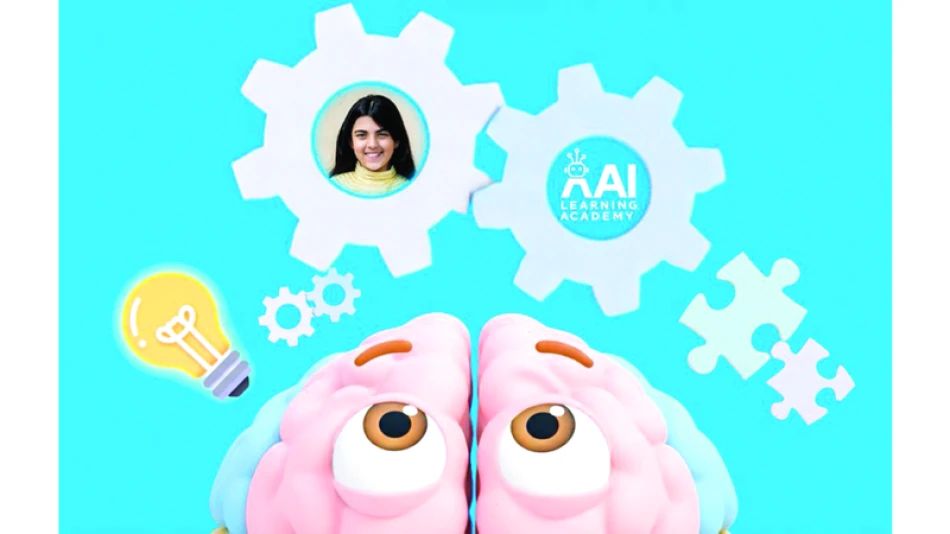
Emirati Entrepreneur Revolutionizes AI and Financial Literacy for Children
11-Year-Old UAE Student Builds Global AI and Financial Literacy Empire Reaching 35 Countries
While most children her age are focused on elementary school subjects, 11-year-old Emirati student Dhabi Al Mehiri has emerged as a formidable force in educational innovation, creating specialized academies that teach artificial intelligence and financial literacy to children across 35 countries. Her interactive approach has already reached 4,500 beneficiaries, positioning the UAE as a surprising leader in youth-driven educational technology.
From Student to Global Educator in Record Time
Al Mehiri's journey began in Al Ain, where she completed an advanced AI engineering program with IBM, supported by the Mohammed bin Rashid Al Maktoum Knowledge Foundation and the UN Development Programme. After completing over 162 hours of intensive training, she made a strategic pivot that few adults would consider: instead of simply consuming knowledge, she became a knowledge creator.
Her decision reflects a broader trend in the Gulf region, where governments are investing heavily in AI education and digital transformation. The UAE's National AI Strategy 2031 aims to make the country a global AI hub, and young innovators like Al Mehiri represent the practical implementation of this vision at the grassroots level.
Breaking the Screen Fatigue Barrier
"I knew that children get bored with screens, so I made sure to make the content fun and interactive, focusing on ethics, privacy protection, and using free and safe technologies for AI experience," Al Mehiri explained. This insight addresses a critical challenge in modern education: maintaining engagement in an increasingly digital world.
Her 20-lesson curriculum includes hands-on projects such as training AI models, command-based chatbot programming, and practical worksheets. Notably, she has designated certain live lessons exclusively for girls, directly addressing the global gender gap in STEM education—a strategy that mirrors initiatives in Singapore and South Korea, where targeted gender-specific programming has shown measurable results in closing educational divides.
Inclusive Design Sets Global Standard
Al Mehiri's integration of children with special needs into her educational framework represents a sophisticated understanding of inclusive design principles typically seen in established EdTech companies. This approach positions her academies ahead of many commercial competitors who treat accessibility as an afterthought rather than a core feature.
Financial Literacy: The Strategic Second Act
Recognizing that technical skills without financial acumen create incomplete entrepreneurs, Al Mehiri recently launched her Financial Literacy Academy for Children. "Financial literacy is not a luxury, but a necessity. I want to teach children how to think like entrepreneurs from a young age, and how to invest, save, and innovate their own projects," she stated.
This expansion mirrors successful models in countries like Australia and Canada, where financial literacy has become mandatory in school curricula. However, Al Mehiri's approach targets younger demographics than traditional programs, potentially creating a competitive advantage for UAE students in global markets.
Learning from Wall Street Legends
Al Mehiri's methodology draws inspiration from Ray Dalio, founder of Bridgewater Associates, after completing his wealth management academy in collaboration with the Abu Dhabi Global Market Academy. This connection to institutional-grade financial education gives her curriculum credibility that typical children's programs lack.
Her dual focus—short-term goals of teaching savings, investment, and small business thinking, alongside long-term objectives of building an economically aware generation—reflects sophisticated strategic planning that many established educational institutions struggle to achieve.
Market Implications and Investor Interest
Al Mehiri's success signals a significant shift in the EdTech landscape. Her ability to scale across 35 countries without traditional venture capital backing demonstrates the power of organic growth in educational technology. This model could attract attention from impact investors and educational institutions seeking cost-effective, scalable solutions.
The integration of AI and financial literacy education also addresses two of the fastest-growing skill gaps in the global economy. Companies like Google, Microsoft, and Amazon are investing billions in AI education initiatives, while financial services firms increasingly recognize the need for earlier financial education intervention.
Recognition and Future Trajectory
Al Mehiri's receipt of the Princess Diana Award underscores the international recognition of her impact. This accolade, previously awarded to young changemakers who later became global leaders, suggests her initiatives may influence educational policy beyond the Middle East.
Her story represents more than individual achievement—it exemplifies the UAE's broader strategy of positioning itself as a knowledge economy leader. As traditional oil revenues face long-term uncertainty, initiatives like Al Mehiri's demonstrate the country's commitment to human capital development as an economic cornerstone.
The combination of government support, international partnerships, and grassroots innovation creates a replicable model that other nations may adopt. For investors and policymakers, Al Mehiri's academies offer a preview of how educational entrepreneurship might evolve in an AI-driven economy where age becomes less relevant than capability and vision.
Most Viewed News

 Sara Khaled
Sara Khaled






